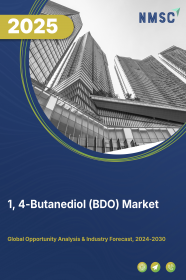
1,4-Butanediol Market by Type (Synthetic & Bio), by Technology (Reppe Process, Genomatica’s Process, Fermentation-Based Process, Davy Process, Butadiene Process, Propylene Oxide Process, & Others), by End-User (Electrical & Electronics Industry, Pharmaceutical, Leather, Agricultural Chemicals, Textiles, Industrial Powder Tools, Automotive Industry, Consumer Appliances, & Sporting Goods) & by Application - Global Opportunity Analysis and Industry Forecast, 2024–2030
Market Definition
The global 1,4-Butanediol Market size was valued at USD 7.18 billion in 2023 and is predicted to reach USD 12.68 billion by 2030, with a CAGR of 8.4% from 2023 to 2030. 1,4-Butanediol, also known as BDO or BD, is an organic compound and a primary alcohol with the formula HO−CH2−CH2−CH2−CH2−OH or C4H10O2.
It is a colorless, oily, and viscous liquid that has great solubility in water and other chemicals. 1,4-Butanediol is known to be one of the stable forms or isomers of butanediol. It is used as a solvent in the manufacturing of various types of liquid, elastic fibers, and polyurethanes. In addition, these chemicals are widely used in engineering plastics, cosmetics, hardeners, solvents, and rust removers.
Market Dynamics and Trends
The demand for 1,4-Butanediol is increasing due to the rise in the usage of tetrahydrofuran and polybutylene terephthalate in applications including automobile bumpers, computer housings, plumbing, and others. It is also used as an insulator in electrical and electronic components. Also, a major factor that influences the global 1,4-butanediol market is the growing awareness regarding the benefits and processing of BDO and its derivatives.
Moreover, environmental issues including depletion of non-renewable resources such as natural gas and crude oil are propelling the need for the production of renewable resources or sustainable products such as tetrahydrofuran and polybutylene terephthalate. This is further expected to boost the growth of the BDO market throughout the forecast period.
However, the high cost of manufacturing associated with 1,4-butanediol and volatility in raw material prices are the factors that are expected to restrain the market growth of 1,4-butanediol during the forecast period. On the contrary, the development of BDO using coal-to-chemical technology and the production of bio-based BDO are expected to create ample opportunities for the 1,4-butanediol market shortly.
Market Segmentations and Scope of the Study:
The global 1,4-butanediol market is segmented based on type, technology, end-user, application, and geography. Based on type, the market is classified into synthetic and bio. The bio segment is further bifurcated into sugar and biomass. Based on technology, the market is categorized into the Reppe process, Genomatica’s process, fermentation-based process, davy process, butadiene process, propylene oxide process, and others.
Based on end-user, the market is subdivided into the electrical & electronics industry, pharmaceutical, leather, agricultural chemicals, textiles, industrial power tools, automotive industry, consumer appliances, and sporting goods. Based on application, the market is segmented into tetrahydrofuran (THF), polybutylene terephthalate (PBT), polyurethanes (PU), gamma-butyrolactone (GBL), and others. The geographical breakdown and analysis of each of the aforesaid segments include regions such as North America, Europe, Asia-Pacific, and RoW.
Geographical Analysis
Asia-Pacific dominates the global 1,4-butanediol market currently and is expected to remain dominant in the market throughout the forecast period. This is attributed to factors such as an increase in the demand for leather and textiles in this region. China is the main hub for textiles that incorporates BDO as adhesives, followed by India.
In addition, rising health- and self-consciousness among consumers are encouraging them to incorporate sports and fitness activities into their daily routines. This factor leads to increased demand for sports equipment in this region. This, in turn, is driving the market growth in this region during the forecast period.
On the other hand, North America is expected to show substantial growth in the global market, due to the extensive use of BDO in the pharmaceutical industries coupled with its utilization in the production of agricultural chemicals in this region. Additionally, the prominent uses of automotive industries that employ BDO and its utilization in the production of consumer appliances are expected to drive market growth in this region shortly.
Competitive Landscape
Several market players operating in the 1,4-butanediol industry include BASF, Ashland, Nay ya Plastic Corporation, DCC, Mitshubishi, Evonik, LyondellBasell, Sipchem, ENEOS, Genomatica These market players are adopting various collaboration strategies and planning expansion of businesses across various regions to maintain their dominance in the global 1,4-Butanediol market.
For instance, in July 2021, Genomatica, Inc. announced its collaboration with Cargill and Helm to build a plant with a capacity of 65,000 metric tons per year to produce green BDO by using renewable feedstock. Genomatica would supply the technology to convert sugars into BDO. Also, in April 2021, Xinjiang Guotai Xinhua Chemical Co., Ltd. started the Coal-based Fine Chemicals Circular Economy Industrial Park Phase II project to produce acetylene and formaldehyde hydrogen along with 1,4-Butanediol through the acetylene aldehyde method. This project would help produce 100,000 tons of 1,4-butanediol and 1,200 tons of butanol as a by-product.
Key Benefits
-
The 1,4-Butanediol market report provides a quantitative analysis of the current market and estimations from 2024 to 2030. This analysis assists in identifying the prevailing market opportunities to capitalize on.
-
The study comprises of a detailed analysis of the 1,4-Butanediol market trends including the current and future trends for depicting the prevalent investment pockets in the market.
-
The information related to key drivers, restraints, and opportunities and their impact on the 1,4-Butanediol market is provided in the report.
-
The competitive analysis of the market players along with their market share in the 1,4-Butanediol market is mentioned.
-
The SWOT analysis and Porter’s Five Force’s model are elaborated in the study.
-
The value chain analysis in the market study provides a clear picture of the stakeholders’ roles.
Key Market Segments
By Type
-
Synthetic
-
Bio
-
Sugar
-
Biomass
-
By Technology
-
Reppe Process
-
Genomatica’s Process
-
Fermentation-Based Process
-
Davvy Process
-
Butadiene Process
-
Propylene Oxide Process
-
Others
By End User
-
Electrical & Electronics Industry
-
Pharmaceutical
-
Leather
-
Agricultural Chemicals
-
Textiles
-
Industrial Power Tools
-
Automotive Industry
-
Consumer Appliances
-
Sporting Goods
By Application
-
Tetrahydrofuran (THF)
-
Polybutylene Terephthalate (PBT)
-
Polyurethanes (PU)
-
Gamma-Butyrolactone (GBL)
-
Others
By Geography
-
North America
-
U.S.
-
Canada
-
Mexico
-
-
Europe
-
U.K.
-
Germany
-
France
-
Italy
-
Spain
-
Russia
-
Sweden
-
Rest of Europe
-
-
Asia-Pacific
-
China
-
India
-
Japan
-
South Korea
-
Australia
-
Indonesia
-
Singapore
-
Rest of Asia-Pacific
-
-
RoW
-
UAE
-
Saudi Arabia
-
South Africa
-
Brazil
-
Israel
-
Turkey
-
Remaining Countries
-
Key Players:
-
BASF
-
Ashland
-
Nay ya Plastic Corporation
-
DCC
-
Mitshubishi
-
Evonik
-
LyondellBasell
-
Sipchem
-
ENEOS
-
Genomatica
REPORT SCOPE AND SEGMENTATION:
|
Parameters |
Details |
|
Analysis Period |
2023–2030 |
|
Base Year Considered |
2023 |
|
Forecast Period |
2024–2030 |
|
Market Size Estimation |
Billion (USD) |
|
Market Segmentation |
By Type (Synthetic and Bio), by Technology (Reppe Process, Genomatica’s Process, Fermentation-Based Process, Davvy Process, Butadiene Process, Propylene Oxide Process, and Others), by End-User (Electrical & Electronics Industry, Pharmaceutical, Leather, Agricultural Chemicals, Textiles, Industrial Powder Tools, Automotive Industry, Consumer Appliances, and Sporting Goods), and by Application (Tetrahydrofuran (THF), Polybutylene Terephthalate (PBT), Polyurethanes (PU), Gamma-butyrolactone (GBL), and Others) |
|
Geographical Segmentation |
North America (U.S., Canada, Mexico) Europe (U.K., Germany, France, Italy, Spain, Russia, Sweden, Rest of Europe), Asia-Pacific (China, India, Japan, South Korea, Australia, Indonesia, Singapore, Rest of Asia-Pacific), Rest of the World (UAE, Saudi Arabia, South Africa, Brazil, Israel, Turkey, Remaining Countries) |
|
Companies Profiled |
BASF,Ashland,NayyaPlastic Corporation,DCC,Mitshubishi,Evonik,LyondellBasell,Sipchem,ENEOS,Genomatica |

















 Speak to Our Analyst
Speak to Our Analyst





















